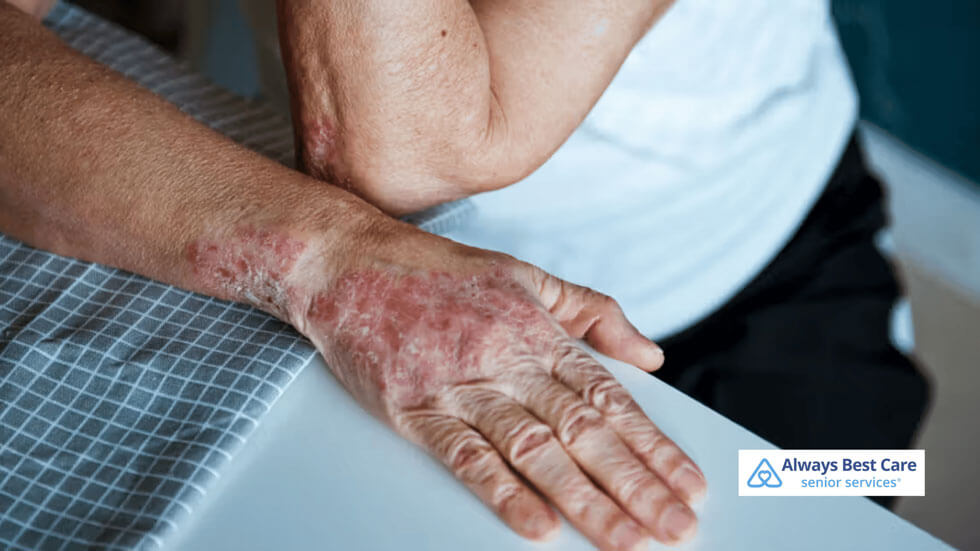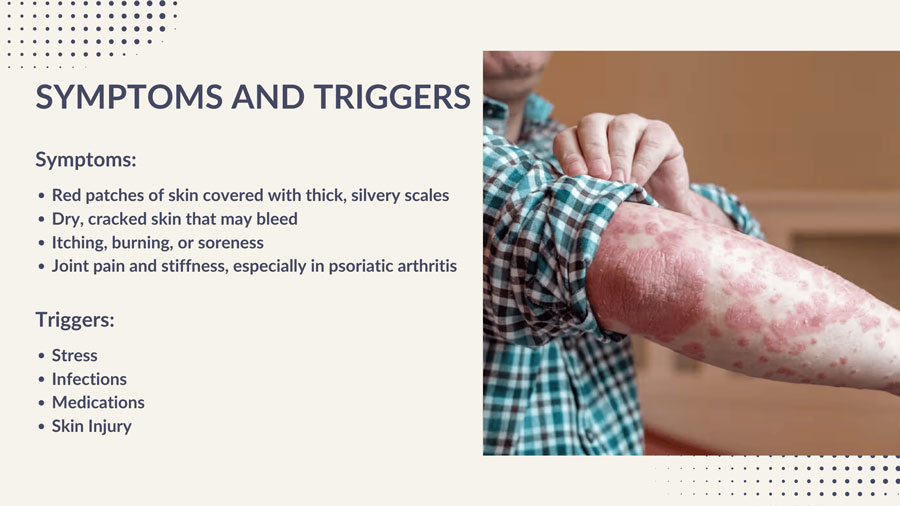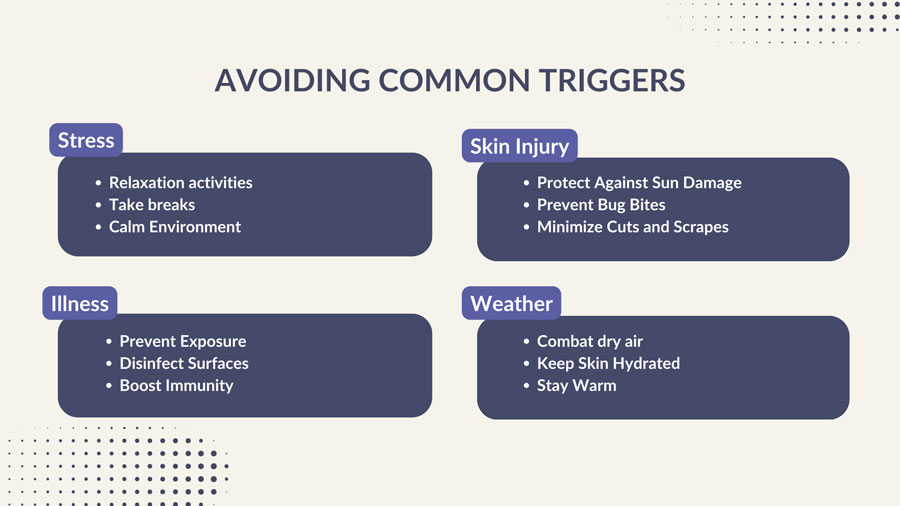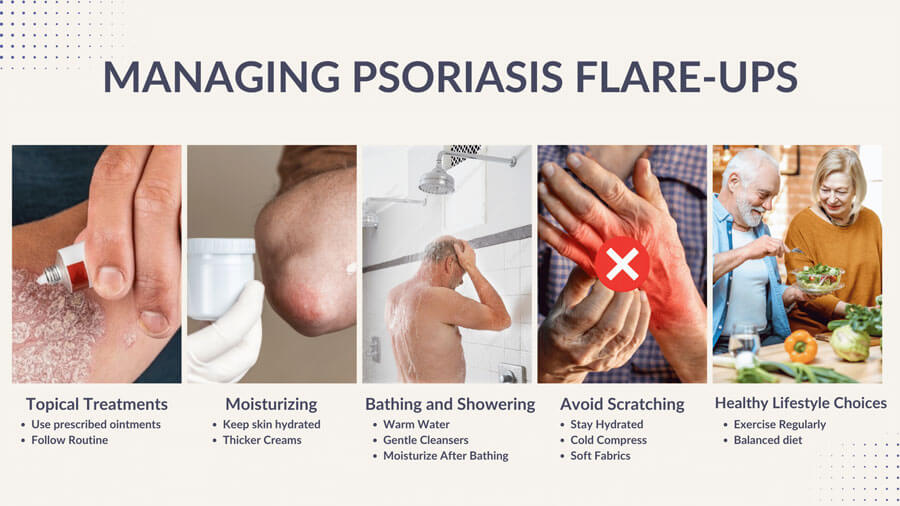Managing Psoriasis Flare-Ups: Tips for Seniors

Psoriasis is a chronic skin condition affecting around 7.5 million adults in the United States, including many seniors. Managing psoriasis can be tricky as we age due to changes in skin health and overall lifestyle. However, with the right strategies, you can effectively manage your symptoms and maintain a high quality of life. Here are some practical tips for seniors to navigate and minimize psoriasis flare-ups.
Table of Contents
Understanding Psoriasis
Psoriasis happens when the immune system mistakenly attacks healthy skin cells, causing them to grow too quickly. This rapid turnover leads to a build-up of cells on the skin’s surface, forming scales and red patches that can be itchy and painful.
Symptoms and Triggers

Psoriasis symptoms can vary but often include:
- Red patches of skin covered with thick, silvery scales
- Dry, cracked skin that may bleed
- Itching, burning, or soreness
- Joint pain and stiffness, especially in psoriatic arthritis
Several factors can trigger psoriasis flare-ups, including:
- Stress: Both physical and emotional stress can worsen symptoms.
- Infections: Certain infections, like strep throat, can trigger psoriasis.
- Medications: Some drugs, such as lithium and beta-blockers, can provoke symptoms.
- Skin Injury: Cuts, scrapes, or severe sunburn can cause a psoriasis outbreak.
Avoiding Common Triggers

Identifying and avoiding triggers can significantly help manage psoriasis flare-ups. Here are some detailed tips on how to navigate and minimize common triggers:
Stress
Stress is a well-known trigger for psoriasis flare-ups. Managing stress through relaxation activities and creating a calm environment can help keep symptoms under control.
- Relaxation Activities: Incorporate meditation, deep breathing exercises, yoga, or journaling into your daily routine. These practices can help calm your mind and reduce stress levels.
- Take Breaks: Whenever you feel overwhelmed or stressed, take a moment to step away and do something relaxing. This could be reading a book, listening to music, or taking a short walk.
- Calm Environment: Surround yourself with people who help you feel calm and avoid those who cause agitation or stress. Creating a peaceful living space with soothing colors, soft lighting, and calming scents can also reduce stress.
Illness
Infections and illnesses can trigger psoriasis flare-ups, so it’s essential to take steps to prevent exposure and boost your immune system.
- Prevent Exposure: Avoid close contact with sick individuals, especially during cold and flu season. Practice frequent hand washing and use hand sanitizers when necessary.
- Disinfect Surfaces: Regularly clean surfaces that are frequently touched, such as doorknobs, light switches, and remote controls, to reduce the risk of infection.
- Boost Immunity: Include immune-boosting foods in your diet, such as citrus fruits, garlic, ginger, and leafy greens. Staying hydrated and getting enough sleep also supports a healthy immune system.
Skin Injury
Injuries to the skin, such as cuts, scrapes, and sunburns, can trigger psoriasis flare-ups. Taking precautions to protect your skin can help minimize these risks.
- Protect Against Sun Damage: Use a broad-spectrum sunscreen with an SPF of at least 30 when spending time outdoors. Wear protective clothing, such as hats and long sleeves, to shield your skin from harmful UV rays.
- Prevent Bug Bites: Apply bug repellent when spending time outside and use natural deterrents like citronella candles to keep bugs away. Wearing long sleeves and pants can also help protect against bites.
- Minimize Cuts and Scrapes: Be mindful of your surroundings and take precautions to avoid skin injuries. For example, wear gloves when gardening, use caution when handling sharp objects, and keep your living space free of hazards.
Weather
Weather changes, especially in winter, can cause dry skin and trigger psoriasis flare-ups. Taking steps to combat dry air and protect your skin can help maintain its health.
- Combat Dry Air: Use a humidifier in your home during the winter to add moisture to the air. This can help prevent your skin from becoming dry and itchy.
- Keep Skin Hydrated: Apply a moisturizing lotion regularly to keep your skin hydrated. Look for products specifically designed for sensitive skin or those with psoriasis.
- Stay Warm: Wear warm clothing and layer up to protect your skin from the cold. Avoid spending too much time in cold, dry environments, and try to stay indoors during extreme weather conditions.
By paying close attention to these common triggers and taking proactive steps to avoid them, you can better manage your psoriasis and reduce the frequency and severity of flare-ups.
Managing Psoriasis Flare-Ups

Managing psoriasis can be particularly challenging for seniors due to changes in skin health, immune function, and overall lifestyle. However, with the right strategies and habits, it is possible to control flare-ups and maintain a high quality of life. Here are some tips to help manage psoriasis symptoms effectively:
Topical Treatments
- Use Prescribed Ointments: Apply any topical treatments as directed by your doctor. These often contain steroids, vitamin D, or salicylic acid.
- Follow Routine: Stick to your prescribed routine to avoid overuse and potential side effects.
Moisturizing
- Keep Skin Hydrated: Use a lotion designed for psoriatic skin. Apply it whenever your skin feels dry or cracked.
- Thicker Creams: Consider using thicker, emollient-rich creams for longer-lasting hydration. Apply in the morning and evening.
Bathing and Showering
- Warm Water: Use warm water, not hot, and keep showers and baths for 10 minutes or less.
- Gentle Cleansers: Use hypoallergenic, fragrance-free cleansers to avoid dryness.
- Moisturize After Bathing: Apply moisturizer immediately after bathing to lock in moisture.
Avoid Scratching
- Stay Hydrated: Keep your skin well-moisturized to reduce itching.
- Cold Compress: Apply a cold compress to relieve itching.
- Soft Fabrics: Wear soft, breathable fabrics and keep your nails short to minimize damage from scratching.
Healthy Lifestyle Choices
- Exercise Regularly: Engage in low-impact activities like walking, swimming, or yoga to reduce stress and boost overall health.
- Balanced Diet: Eat a diet rich in anti-inflammatory foods such as fruits, vegetables, lean proteins, and whole grains. Include foods high in omega-3 fatty acids like salmon, flaxseeds, and walnuts.
How Always Best Care Can Help

At Always Best Care, we understand the challenges seniors face in managing psoriasis. Our caregivers are dedicated to providing personalized support to help you maintain your health and well-being. Whether you need assistance with daily skincare routines, medication management, or emotional support, we’re here to help. Contact Always Best Care of Shreveport at (318) 431-8581 to learn more and schedule your free consultation.





